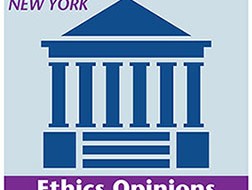Improper Provisions in Retainer Agreements
By Lazar Emanuel [Originally published in NYPRR October 1999]
N.Y. State Opinion 719 (1999)
The Rules of the Appellate Division require that all attorneys in domestic relations matters “execute a written agreement with the client setting forth in plain language the terms of compensation and the nature of the services to be rendered.” [22 NYCRR §1400.3.] The Rules also require that the agreement express the circumstances under which “the attorney might seek to withdraw from the case for nonpayment of fees.”
A law firm proposes to insert four provisions dealing with compensation and withdrawal in its retainer agreements. It asks the NYSBA Committee on Professional Ethics whether these provisions are proper.
In its Opinion 719, issued July 28, 1999, the NYSBA Committee on Professional Ethics considered and rejected all four provisions. The Opinion is important for its guidance in the drafting of retainer agreements not only in domestic relations matters but in other matters as well.
Guiding Principles
In its analysis of the proposed provisions, the NYSBA Committee was guided by two basic principles:
Principle 1. A retainer agreement may not be used to expand or relax the limits controlling a lawyer’s right to withdraw. The right to withdraw is controlled by DR 2-110. “DR 2-110(B) sets forth conditions under which a lawyer must seek to withdraw from the representation, while DR 2-110(C) sets forth conditions under which it is permissible for a lawyer to do so.”
Applying this principle, the Committee advised that a lawyer may not enter into, or act in reliance on, a retainer agreement which permits withdrawal under circumstances not anticipated or permitted under DR 2-110. Nor may he enter into an agreement in which the client authorizes a violation of a DR. Nor many the client agree in advance that some future undefined conduct or circumstance will justify withdrawal by the attorney. The client cannot be expected to consent to withdrawal unless his consent is given “knowingly.” i.e., “with knowledge and understanding of the facts and circumstances at the time of the termination of employment.”
Principle 2. A retainer agreement must no “mislead the client with regard to the attorney’s obligations, including the obligation to continue as counsel in the absence of a permissible ground for withdrawing from the representation.”
Applying this second principle, the committee warned that provisions in a retainer agreement referring to conditions under which a lawyer may withdraw must accord with DR 2-110 in a manner which is understandable and not misleading to the client. No matter what an agreement provides, the lawyer may not withdraw unless he has proper grounds under DR 2-110. Even when proper grounds exist, he must first obtain the court’s consent if the matter is before the court. In any event, he must take steps to the extent reasonably practicable to avoid foreseeable prejudice to the client. These steps include giving the client due notice, allowing time for employment of other counsel, turning over the client’s papers and property, and complying with all applicable laws and rules.
Applying Principles to Proposals
Applying these principles to the provisions proposed by the inquiring law firm, the NYSBA Committee concluded as follows:
Proposed Provision #1: Withdrawal for Improper Client Conduct. The client shall not bring legal action, conduct a defense or assert a position in litigation or take steps merely for the purpose of harassing or maliciously injuring any person or entity. The client shall not persist in a course of action or conduct which is illegal, criminal or fraudulent or use or attempt to use the law firm’s services to perpetrate a crime or fraud…such conduct shall be good cause for the law firm to withdraw its representation and the client hereby consents that the law firm may so withdraw…upon notice to the client.”
Committee’s Comments. The provision describes client conduct which would provide permissible, if not mandatory, grounds for withdrawal. However, even though a lawyer may have grounds for withdrawal, it is not enough that the attorney notify the client of his intent to withdraw. In litigated matters, he must first obtain the court’s consent. In all events, he must take all the steps necessary to avoid prejudice to the client, including allowing sufficient time for client to employ other counsel.
The proposed provision is misleading to the client because it suggests that the client has no right to object to the withdrawal even when the attorney has not taken any steps to protect the client against prejudice to him or his rights.
Proposed Provision #2 & #3: Withdrawal for Client’s Failure to Follow Instructions and His Refusal to Engage Experts Recommended By Firm
#2. “The client also agrees to follow all instructions and advice which bear upon ethical, strategic or tactical considerations or matters… In the event that the client fails or refuses to follow such advice or instructions of the firm in any respect and/or engages in other conduct which renders it unreasonably difficult for the firm to carry out employment for the client effectively…such failure, refusal and/or conduct shall be good cause for the law firm to withdraw its representation.”
#3. “…if the client refuses or fails to engage the experts recommended by the law firm, the client acknowledges and agrees that such refusal or failure would represent a serious conflict within the attorney-client relationship and would render it unreasonably difficult, if not impossible, for the law firm to carry out employment effectively and would therefore be good cause for the law firm to withdraw its representation.”
Committee’s Comments. The attorney’s proposals attempt to define in advance the circumstances which would make it “unreasonably difficult for the lawyer to carry out employment effectively,” including the failure of the client to follow all instructions and advice which “bear upon ethical, strategic or tactical considerations and failure to approve and retain any expert recommended by the firm.
These proposals are misleading because a client’s failure to heed the lawyer’s advice or to retain an expert picked by his lawyer will not necessarily make it unreasonably difficult for the lawyer to represent the client effectively. “At times, it may be possible for the lawyer to represent the client effectively notwithstanding the client’s rejection of the lawyer’s advice.”
Furthermore, except in certain areas of legal representation, authority to make decisions “is exclusively that of the client.” To the extent that the proposed provisions compel the client to accept the lawyer’s advice on decisions which are for the client to make, they violate EC 7-7 and EC 7-8.
Failure to Pay Fees Must Be Deliberate
Proposed Provision #4: Failure to Pay Fees or to Agree to Rate Change. “In the event that any bill remains unpaid beyond such 30 day period, or the client fails or refuses to execute an Amendment to the Retainer Agreement, setting forth a rate change, the client agrees that such conduct shall be a deliberate disregard of this agreement and the obligation to the law firm as to expenses and fees. The client agrees that the firm may cease or suspend any work or services…during the preparation and pendency of the motion to withdraw, and may withdraw its representation at the option of the firm upon notice to the client as long as to do so is without foreseeable prejudice to the client’s rights Should the firm so elect to withdraw its representation under such circumstances, the client hereby agrees that such account delinquency shall be good cause and grounds for such withdrawal…”
Committee’s Comments. The proposal dealing with withdrawal for failure by the client to pay the lawyer’s fees within 30 days ignores the requirement that the failure be deliberate. The Committee cited N.Y. State 440 (1976):
“DR 2-110(C) also provides for withdrawal by a lawyer if his client “deliberately disregards an agreement… as to expenses or fees.” The key word is “deliberately.” “Mere failure to pay an agreed fee, which is not deliberate, is not a ground for requesting such permission (to withdraw).” [N.Y. State 212 (1971); N.Y. State 187 (1971).]
The provision is also misleading because it leads the client to think that the lawyer has the right to withdraw even if the client’s failure to pay is unavoidable or unintentional. Further, the agreement may not obligate the client to execute an amendment “setting forth a rate change” as a condition to continued representation.
All retainer agreements, including any amendments, must be reasonable and not excessive. [DR 2-106.] Further, a lawyer may not use the threat of withdrawal to coerce a change in fees after representation begins. Modifications of existing fee agreements will be closely scrutinized to insure reasonableness and fairness. To the extent that the provision suggests that a lawyer has the right to insist on a change in fees as a condition of continued representation, it is misleading, if not entirely improper.
NYSBA Opinion 719 requires careful study by lawyers in their preparation of retainer agreements.
Lazar Emanuel is the Publisher of New York Professional Responsibility Report. He is Executive Vice President and General Counsel, Emanuel Publishing Corp.
DISCLAIMER: This article provides general coverage of its subject area and is presented to the reader for informational purposes only with the understanding that the laws governing legal ethics and professional responsibility are always changing. The information in this article is not a substitute for legal advice and may not be suitable in a particular situation. Consult your attorney for legal advice. New York Legal Ethics Reporter provides this article with the understanding that neither New York Legal Ethics Reporter LLC, nor Frankfurt Kurnit Klein & Selz, nor Hofstra University, nor their representatives, nor any of the authors are engaged herein in rendering legal advice. New York Legal Ethics Reporter LLC, Frankfurt Kurnit Klein & Selz, Hofstra University, their representatives, and the authors shall not be liable for any damages resulting from any error, inaccuracy, or omission.
Related Posts
« Things Old & New — Code Amendments Transactions with Client: Reviewing the No-Nos »







